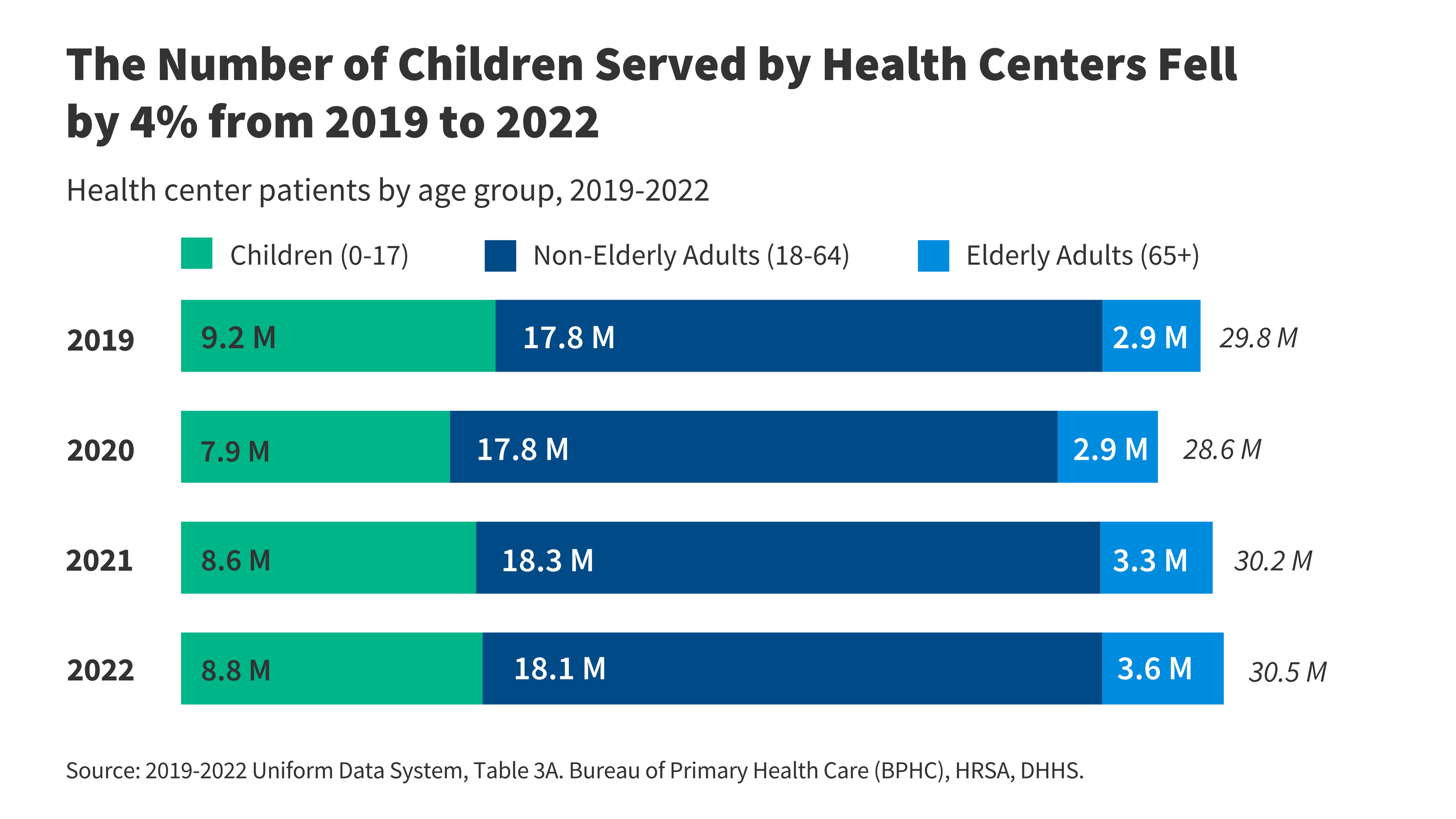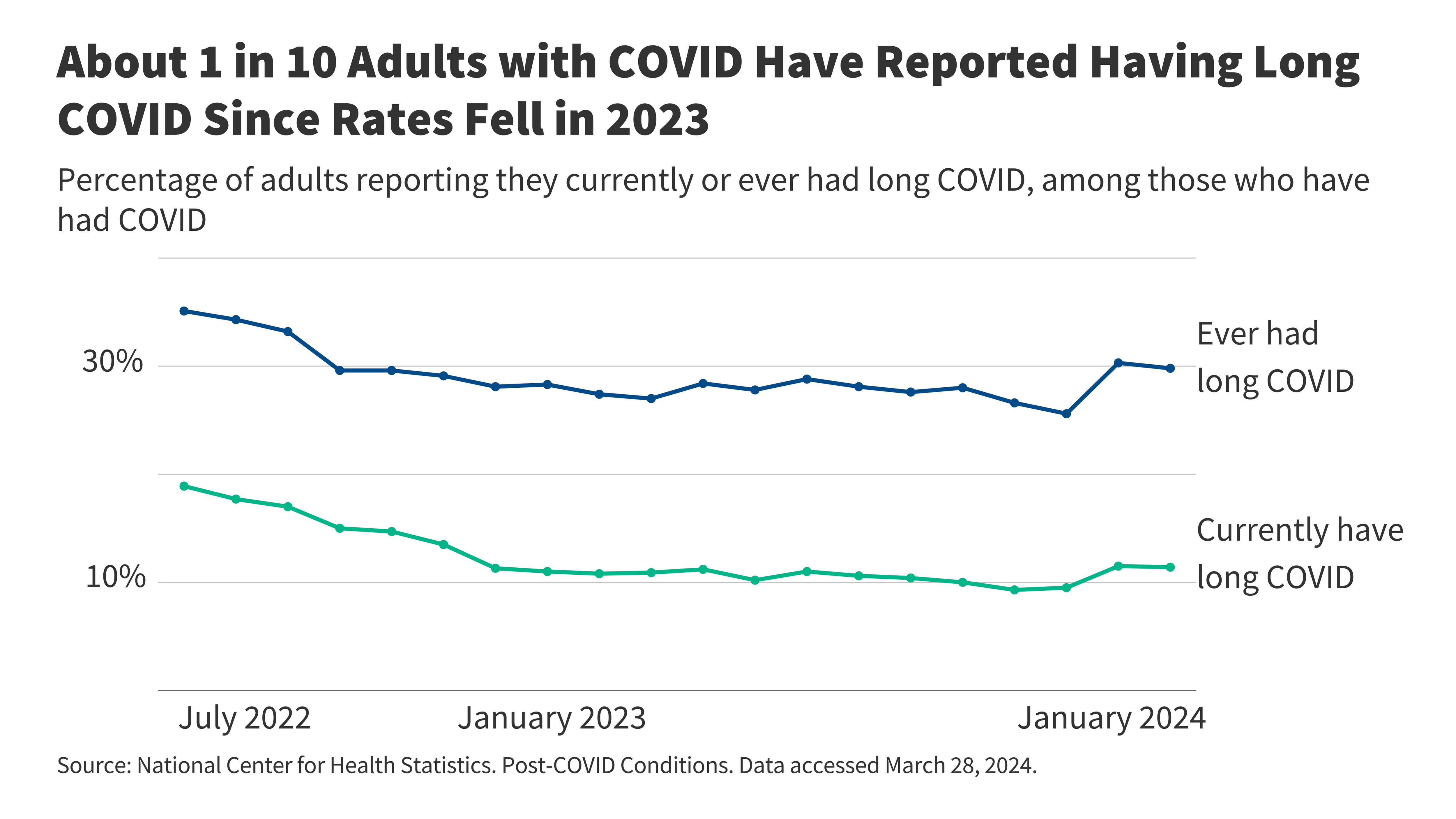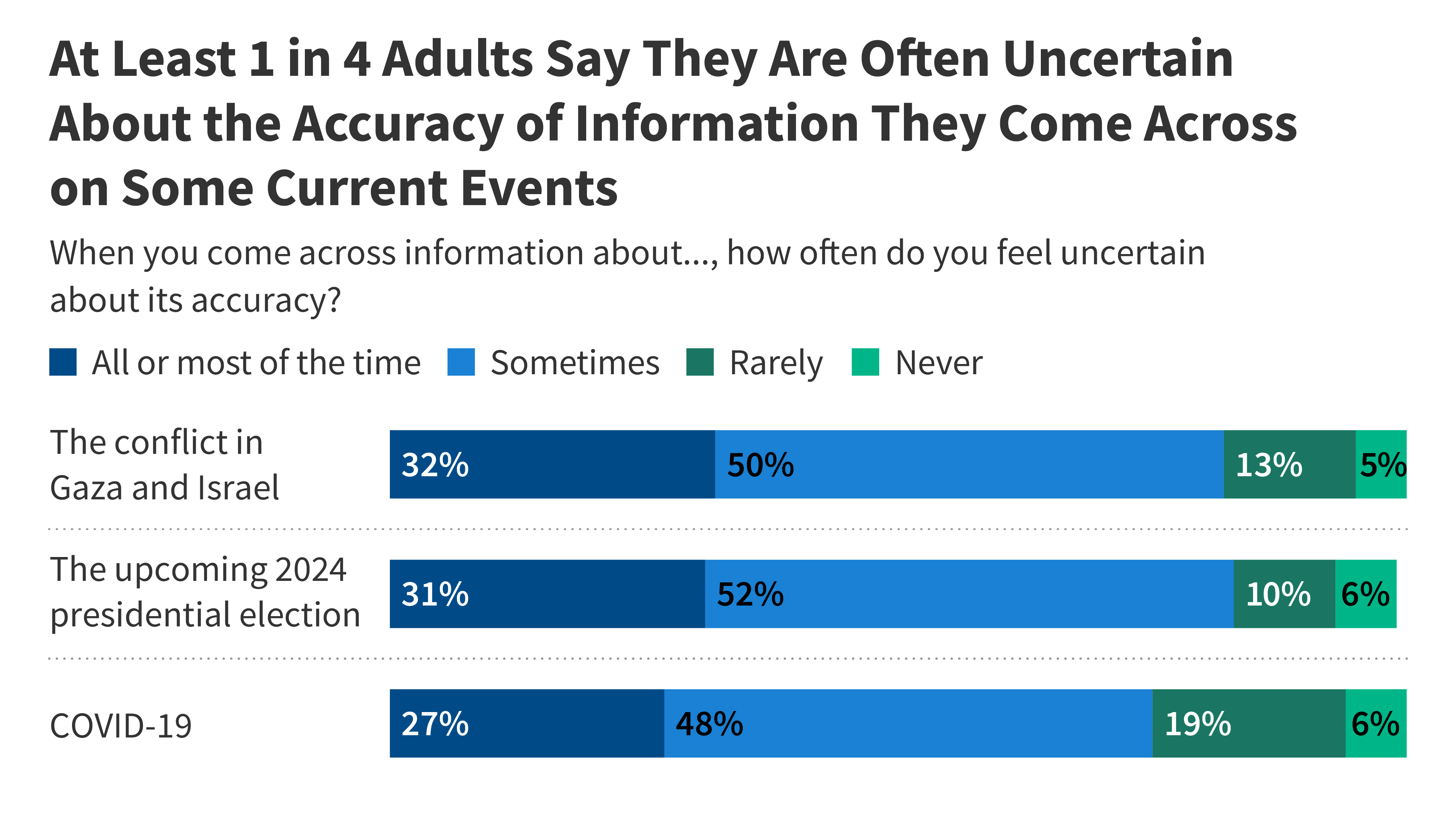Practically half of adults say that they’ll “positively” or “most likely” get the newly really helpful COVID-19 vaccine, although most dad and mom will not be planning to get the shot for his or her kids, in accordance with the newest KFF COVID-19 Vaccine Monitor ballot.
Amongst all adults, 23% say they’ll positively get the brand new vaccine, 23% say they’ll most likely get it, whereas 19% say they’ll most likely not get it and 33% say they positively not get it.
The share of the general public who intend to get the brand new COVID-19 vaccine is increased than the share who’ve acquired earlier booster pictures, however not as excessive as preliminary vaccine uptake again in 2020. Nearly 4 in ten (37%) individuals who beforehand acquired a COVID-19 vaccine say that they most likely or positively gained’t get the brand new shot. Reflecting patterns from earlier vaccine rollouts through the pandemic, the teams most definitely to say they positively or most likely will get the brand new vaccine embody folks no less than 65 years previous (64%) and Democrats (70%).
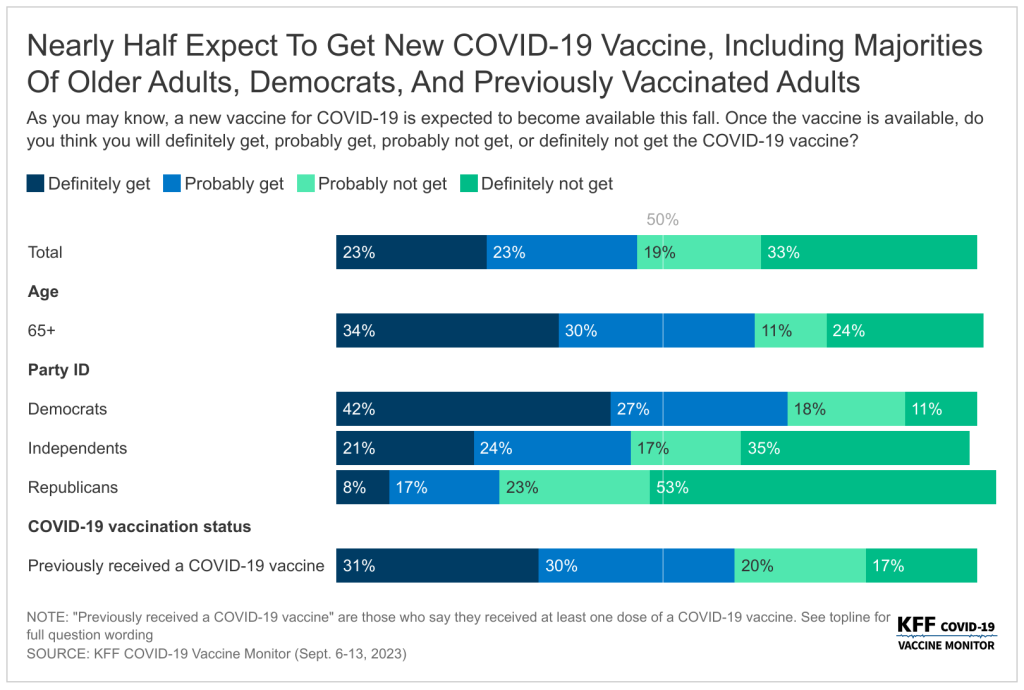
Whereas the brand new COVID-19 vaccine is really helpful for kids ages 6 months and up, fewer than 4 in ten dad and mom say they anticipate to get the vaccine for his or her kids ages 12-17 (39%), ages 5-11 (36%), and ages 6 months by 4 years (34%). Greater than half of oldsters with kids in every age group say they most likely or positively gained’t get their kids vaccinated.
The newest survey additionally exhibits that considerably bigger shares of eligible folks anticipate to get an annual flu shot and a newly really helpful vaccine for RSV (respiratory syncytial virus) than plan to get the COVID-19 vaccine. For instance, most adults (58%) say that they’ve already gotten or anticipate to get a flu shot, and most adults ages 60 and older (60%) say they’ve already gotten or anticipate to get the brand new RSV vaccine (really helpful for his or her age group).
As has been true all through the pandemic, a a lot smaller share of Republicans (24%) than Democrats (70%) anticipate to get the brand new COVID-19 vaccine – 46 proportion level hole.
There are smaller, however nonetheless appreciable, partisan divisions in intentions for these vaccines than for the COVID-19 shot: for instance, 76% of Democrats and 51% of Republican anticipate to get or have already gotten a flu shot this fall (a 25-point hole), whereas amongst these ages 60 and older, 79% of Democrats and 41% of Republicans anticipate to get or having already gotten an RSV vaccine (a 38-point hole)
Republicans are additionally much less possible than Democrats to be assured that every of three vaccines are protected, with the most important divide for the COVID-19 vaccine (84% of Democrats and 36% of Republicans are assured it’s protected).
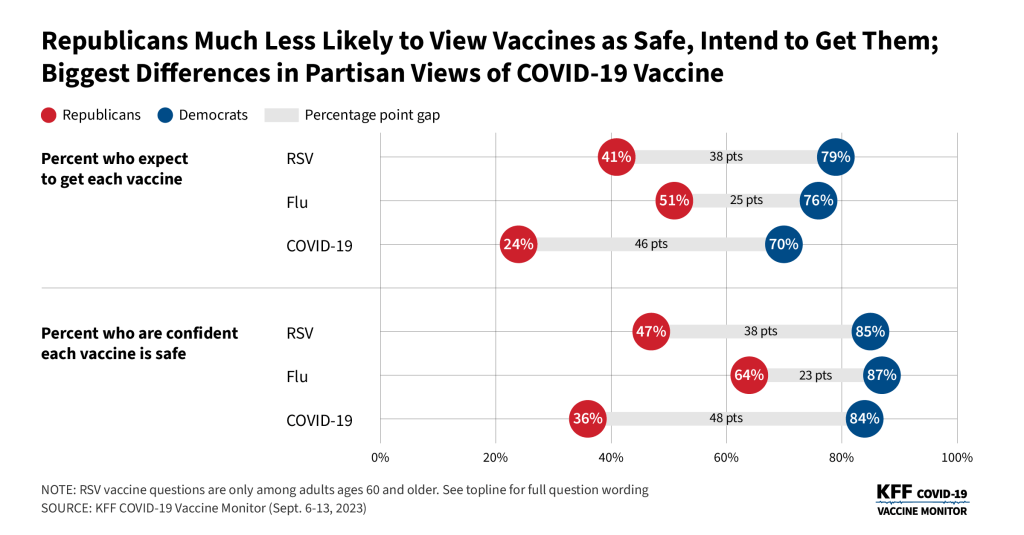
The partisan divides persist throughout a variety of measures associated to vaccines and the COVID-19 pandemic. Some examples:
- Belief in public well being businesses. Total, 63% of the general public belief the Facilities for Illness Management and Prevention (CDC) an ideal deal or a good quantity in terms of offering dependable details about vaccines, and 61% belief the Meals and Drug Administration (FDA). A lot bigger shares of Democrats than Republicans have no less than a good quantity of belief in vaccine info from the CDC (88% vs. 40%), their native public well being departments (87% vs. 51%), and the Meals and Drug Administration (86% vs. 42%).
- Perceptions about risk. Three quarters (77%) of Democrats say that there’s a new wave of COVID-19 infections throughout the nation. In distinction, comparable shares of Republicans say there may be (48%) and isn’t (51%) a brand new wave.
- Taking precautions. Democrats are greater than 3 times as possible as Republicans (58% vs. 16%) to say that information in regards to the new COVID-19 wave has led them to take further precautions, together with being extra more likely to put on a masks in public or keep away from giant public gatherings, or being much less more likely to journey or to dine indoors at eating places.
- Getting examined. Republicans are half as possible as Democrats (9% vs. 19%) to say that they have been sick in current months and received a COVID-19 take a look at.
“The ballot exhibits that a lot of the nation nonetheless trusts the CDC and the FDA on vaccines – however there’s a partisan hole, and most Republicans don’t belief the nation’s regulatory and scientific businesses chargeable for vaccine approval and steerage,” KFF President and CEO Drew Altman stated.
One space the place partisans agree is that their private docs, together with their kids’s pediatricians, are their most trusted sources of vaccine info.
Most adults (68%) additionally say they usually maintain up-to-date with the vaccines which might be really helpful by their very own physician, together with 82% of Democrats and 61% of Republicans. Massive majorities of oldsters – no matter partisan identification – say they maintain their kids updated on really helpful childhood vaccines, with simply 10% saying they delayed or skipped some vaccines.
Different ballot outcomes embody:
- Following the top of the COVID-19 public well being emergency in Might, most insured folks now say they’re not sure whether or not their medical insurance covers both in-home, speedy COVID-19 assessments (55%) or PCR COVID-19 assessments which might be despatched to a lab for outcomes (61%).
- As well as, one in seven (15%) say they’ve needed to get a COVID-19 take a look at however weren’t capable of finding or afford one. These most definitely to report difficulties acquiring a COVID-19 take a look at contains no less than one in 5 Black adults (25%), Hispanic adults (21%), and folks with family incomes beneath $40,000 yearly (21%).
- Most adults (68%) and oldsters (55%) – say that wholesome kids must be required to be vaccinated towards measles, mumps, and rubella to attend public college; fewer adults (31%) and oldsters (43%) say that oldsters ought to be capable of determine to not vaccinate their kids even when that will create well being dangers for others.
Designed and analyzed by public opinion researchers at KFF, the survey was performed from September 6-13, 2023, on-line and by phone amongst a nationally consultant pattern of 1,296 U.S. adults. Interviews have been performed in English and in Spanish. The margin of sampling error is plus or minus 4 proportion factors for the total pattern. For outcomes based mostly on different subgroups, the margin of sampling error could also be increased.


